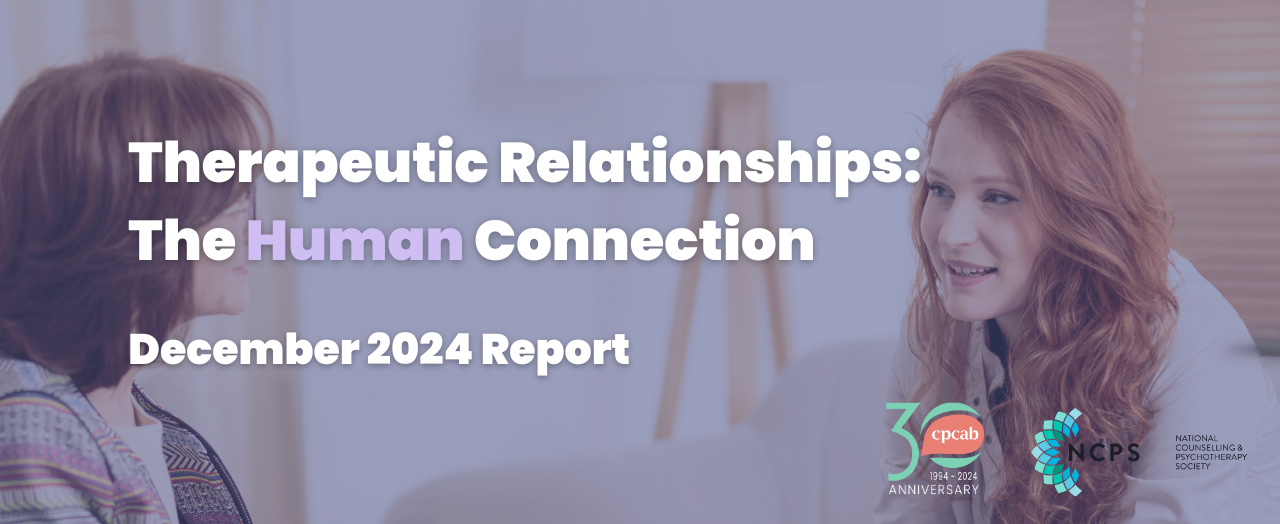
The Influence of Educator Identity and Narrative on Counselling Training
When I recently contributed to the podcast Reflections on Identity hosted by Neil Hopkins and Carol Thompson, I was intrigued by the thought-provoking questions they posed: Why is educator identity important? What’s the relationship between an educators role and identity? Does identity form in collaboration with others, and is there cognitive dissonance in the education landscape? In the podcast I talk about how my roles, background, and philosophical underpinning has influenced my personal and professional identity.
This discussion prompted me to reflect on how my own professional training deepened my
awareness of ‘identity’ and encouraged me to meet ‘myself’ with compassion. Training helped me
to bring a more intentional, evolving sense of self into my work, which is crucial in counselling
education.
My current role as an educator at CPCAB, an awarding organisation for counselling training, goes
far beyond designing or delivering content. It’s deeply intertwined with my values, personal history,
and professional self-understanding. In my previous roles as counselling curriculum manager,
lecturer, and teacher trainer, I’ve seen how tutors’ self-perception as instructors, facilitators, and
professionals with lived experience directly influences their teaching approaches and ultimately,
their learners’ experiences.
Carl Rogers, the American psychologist known for his humanistic, person-centred approach,
introduced the idea of ‘conditions of worth’, a notion that our sense of value often relies on others’
approval, with these internalised messages shaping our self-concept and identity.
In this article, I explore how tutors’ values, personal experiences, and sense of self shape the
learning environment and influence how learners form their own professional identities. Drawing on
personal reflections, person-centred theory, and the dynamics of teaching, I highlight the power of
modelling authenticity, reflexivity, and presence in the training space. I invite colleagues to look
inward and consider how who we are is just as important as what we teach. I show how an
educator’s identity and personal narrative can shape their approach to counselling training and
play a vital role in the learner journey.
The Role of Educator Identity in Training
An educator’s identity does not simply arise from their role, it informs how they relate to learners, share knowledge, and foster connection. In counselling training, where learning is deeply personal and relational, this influence is especially pronounced.As a therapist and educator, I’ve seen how much my values and life story have shaped my approach. Education has always been core to my sense of self; a pathway to personal growth and validation. My father, born into poverty in London’s East End in 1930, missed out on schooling during WWII but went on to earn a Master’s in his 40s and, remarkably, a PhD in his 80s. His resilience left a lasting impression.
Growing up with an insecure attachment to my parents, I often sought approval especially from my father, and education became a way to prove my worth. These early experiences profoundly influenced my values as an educator and shaped my belief that learning is not just about gaining knowledge, but also about personal transformation and lifelong growth.
Creating a Supportive Learning Environment
Rogers’ concept of conditions of worth appears in subtle but powerful ways in education. For example, if a tutor unconsciously equates success with perfection, learners may begin to feel valued only when they meet those high expectations. In contrast, when tutors model learning as a process that welcomes vulnerability and reflection, they create a space of psychological safety. In doing so, they embody qualities central to therapy; genuineness, empathy, and unconditional positive regard.How we see ourselves as educators has real impact. When we embrace the role of facilitator rather than expert, we invite learners into a more collaborative, exploratory process. For me, presence matters more than certainty; it’s about holding space for curiosity, connection, and discovery.
Professional Narrative and Reflexivity in Counselling Education
Identity in education is often taken for granted, but it significantly shapes how we teach and relate. My professional identity has evolved through experiences in the classroom, in therapeutic settings, and in qualification development. Each context has offered new insights while reaffirming my commitment to lifelong learning, personal growth, and humanistic values.Just as clients in therapy reframe their personal narratives, counselling learners develop professional ones. When educators engage in reflexivity by examining their assumptions, experiences, and values, they mirror the therapeutic process itself. This fosters environments where authenticity and transformation are central to learning.
The Shared Identity of Counselling Educators
While professional identity is personal, it’s also relational, and shaped by colleagues, institutions, and the wider professional context. In counselling education, a collective identity emerges through shared ethical values, competency frameworks, and reflective practice. At CPCAB, our qualifications align with professional standards, but it’s tutors who bring them to life. Their sense of self and relationship with course content, learners and culture, shape every learning encounter. At tutor standardisation events, for example, discussions often extend beyond technical competencies to consider how to nurture reflective, connected and curious learners.This raises an important question: How much control do educators have over their professional identity? While structures and policies play a role, tutors retain agency in how they express their values and approach their practice. Whether one identifies as an instructor or a facilitator is not just a methodological choice, it reflects a deeper orientation toward self and others.
The Impact on Learner Development
Educator identity has a powerful, often unspoken, influence on learners. Tutors do more than deliver content, they shape how learners view themselves and their capacity to become counsellors.When educators model presence, reflection, and authenticity, they send a powerful message: Who you are matters in this work. This gives learners permission to bring their own values and lived experiences into their developing professional identities. It also helps build a foundation for ethical and empathic practice.
Conclusion: The Power of the Educator’s Self
The identity and narrative we bring as educators shapes far more than a curriculum, it influences the learning journey itself. Our presence, whether conscious or not, affects how learners understand and experience their own worth and capacity.Reflexivity is central to counselling education. Just as we encourage learners to build self-awareness, we too must engage in that inner work. By reflecting on our evolving identities and staying open to growth, we model the transformative nature of therapeutic practice. Ultimately, the educator’s self is a powerful teaching tool. When we show up with compassion, curiosity, and authenticity, we help shape practitioners who know that who they are is central to how they help.
Related Posts

Navigating a Brave New World: AI and Ethics in Therapy
As the digital age continues to reshape our lives, Ken Kelly's insightful article, “A Brave New World: Exploring the Ethical Frontier of AI in Therapy”, offers a timely guide for counsellors grappling...

The Impact of Digitalisation on Counselling Training and Practice
The Counselling and Psychotherapy Central Awarding Body (CPCAB), in collaboration with the National Counselling and Psychotherapy Society (NCPS), has released its December 2024 report...

The Effect of Anxiety on the Risk of Developing Dementia
A recently published study led by researchers at the University of Newcastle in Australia, explored the relationship between chronic versus resolved versus new onset anxiety, and all-cause dementia risk...

